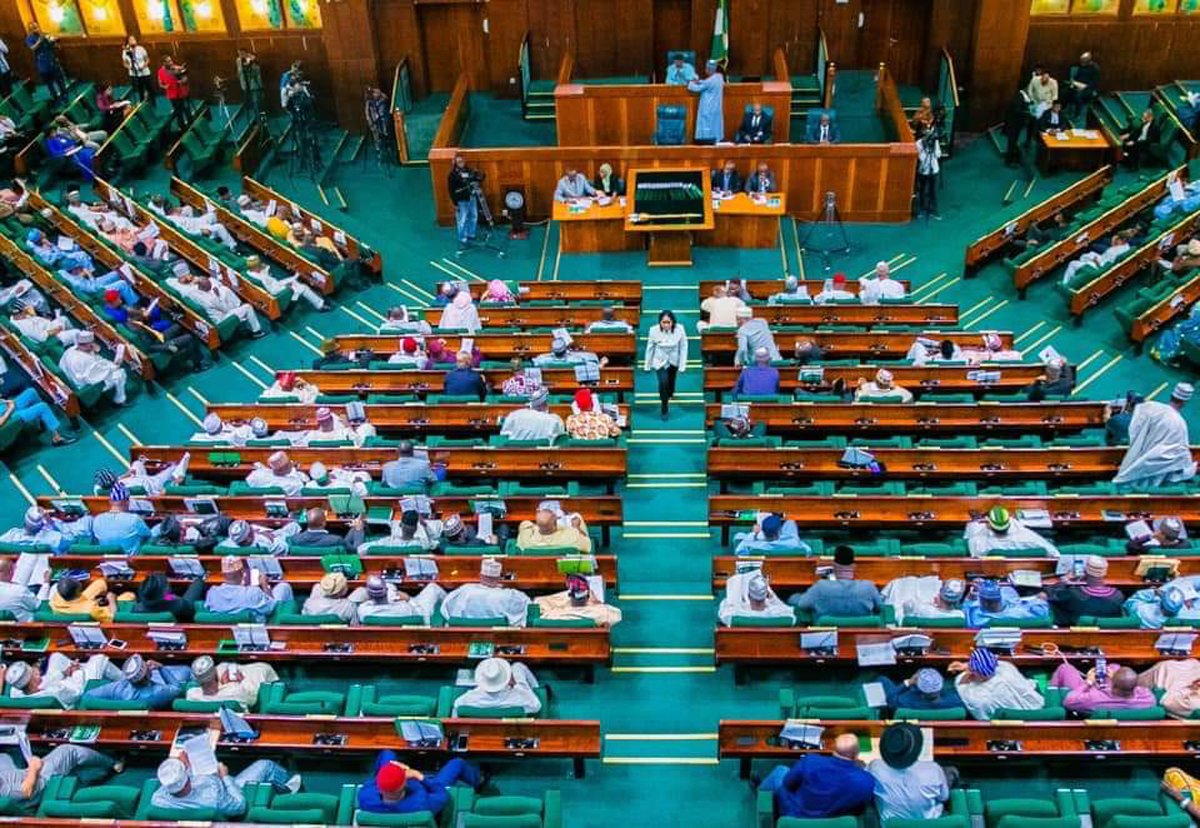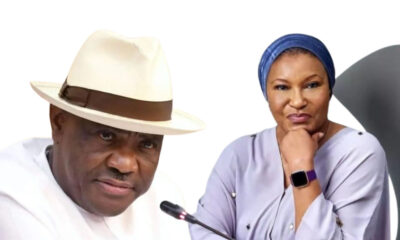News
Reps discover 5 banks withholding $5bn in forex

Reps discover 5 banks withholding $5bn in forex
On Wednesday, the House of Representatives discovered that five banks were withholding $5 billion in currencies.
Worried about the country’s foreign exchange market instability, the House directed the joint Committees on Banking Regulations and Banking Institutions to hold an investigative hearing into banks and financial institutions’ failure to comply with CBN directives on Net Open Position Limits.
The resolution was passed after the adoption of a motion on a Matter of Urgent National Importance regarding the need for banks to implement the CBN’s policies on holding excess long foreign exchange and net open position limits, sponsored by Chairman of the House Committee on Defence, Hon. Babajimi Benson.
In his lead debate, Hon. Benson, who observed that the apex bank is tasked with regulating the monetary policies of the country as provided for by the CBN Act, frowned upon the blatant disregard for extant financial regulations.
According to him, “Records show that GTB, Zenith Bank, UBA, and First Bank have a cumulative excess holding of over $5 billion as of January 2024. The only fully compliant bank is Stanbic IBTC, which has made all FX in its reserve available to their clients.
“It is important to note that these banks often obtain foreign exchange either through purchase, borrowing, or allocation from the CBN at the official rate of N461.5 to a dollar for their various customers but hoard them as part of their bank balances or reserves. They eventually sell at higher rates to make extra profit.
“It is this speculative practice that has prompted the CBN to issue a fresh directive centered around the Net Open Position (NOP) for all commercial banks. Simply put, the NOP measures the difference between a bank’s foreign currency assets (what it owns) and foreign currency liabilities (what it owes). Investigations have shown that banks hold far more forex than they require, thereby creating artificial scarcity and an increase in the exchange rate.
READ ALSO:
- Anambra govt bursts ‘baby factory’, rescue six pregnant teenagers
- BREAKING: Court gives FG 7-day ultimatum to fix price of goods
- BREAKING: Court sentences man who killed Enugu make-up artist to death
“The new CBN directive will help limit how much foreign exchange banks can hold and for how long. The aim is to discourage hoarding of forex, thereby making it available for intended users at reasonable rates.
“Despite measures adopted by CBN in the past and based on previous experiences with CBN policies directives, many banks are in default of its implementation. This explains why eight banks currently hold a huge NOP of over $6 billion while there is a biting scarcity. This motion will provide the legislative impetus for the required action to compel them to fully comply with the directive.”
Hon. Benson observed that Section 8 (4) and (5) of the CBN Act require that the CBN Governor is expected to brief the relevant Committees of the National Assembly during the semi-annual hearings as well as provide periodic reports on the performance of the economy to the National Assembly.
While frowning upon the non-compliance to the extant law, Hon. Benson lamented that: “there has been a steady rise in the rate of the dollar in comparison to the naira. It rose to N1,520 to the dollar last week.
“The House is also concerned that this astronomical rise has been caused by diverse market forces and certain economic policies adopted by the government, including the liberalization of the dollar.
“The House is further concerned, however, that commercial banks and certain financial institutions in Nigeria usually hold back a large part of forex they obtain either through purchase, borrowing, or allocation from the CBN rather than lending to their customers with a view to selling it when the exchange rate is high.
“The House is worried that this speculative activity by commercial banks and certain financial institutions has further exacerbated the harsh economic situation in the country and led to difficulty by legitimate businesses to obtain forex for their business transactions.
“The House is aware that the CBN has intervened by introducing new monetary policies to check the rise in the rate of the dollar, among which are the Net Open Position Limits and holding excess long foreign exchange.
“The House is also aware that commercial banks and certain financial institutions are reluctant to implement the monetary measures put in place by the apex bank to check these unwholesome practices by banks and other financial institutions in the country.
“The House is concerned that unless drastic legislative measures are taken to enforce the implementation of these directives, the country will continue to experience dire economic hardship as a result of the continuous rise in foreign exchange rates,” he warned.
To this end, the House mandated its Committee on Legislative Compliance to ensure full implementation.
Reps discover 5 banks withholding $5bn in forex
News
ICPC, NRC Forge Anti-Graft Alliance to Safeguard Rail Assets

ICPC, NRC Forge Anti-Graft Alliance to Safeguard Rail Assets
The Independent Corrupt Practices and Other Related Offences Commission has pledged closer collaboration with the Nigerian Railway Corporation to strengthen transparency and accountability in the country’s rail sector.
The Resident Anti-Corruption Commissioner (RAAC), Lagos Office, Mr. Alexander Chukwumah, gave the assurance during a courtesy visit to the NRC Managing Director, Dr. Kayode Opeifa, at the corporation’s headquarters.
Chukwumah said the commission was prepared to support the NRC through targeted training programmes aimed at equipping staff with the knowledge to identify and avoid actions that could expose them to corruption-related offences.
He explained that the initiative aligns with the ICPC’s public education mandate to promote integrity across public institutions.
He urged the management of the corporation to work closely with its Anti-Corruption and Transparency Unit, noting that members of the unit had been trained to detect early warning signs and red flags capable of preventing minor lapses from escalating into major institutional crises.
According to him, the visit was also to reinforce the cordial relationship between both agencies and reciprocate the goodwill earlier extended by the railway corporation.
“ICPC is committed to ensuring that NRC workers stay out of trouble. There are ways we can guide you and your team to avoid actions that could expose them to corruption risks,” Chukwumah said.
In his response, Opeifa welcomed the partnership and expressed readiness to deepen collaboration with the anti-graft agency to entrench transparency within the corporation.
The NRC boss observed that the railway system could have achieved greater milestones over the years but for corruption-related setbacks that slowed its growth.
He requested the commission to organise a capacity-building programme for heads of departments and senior management staff to sharpen their understanding of compliance standards and ethical decision-making.
Opeifa identified vandalism of railway infrastructure as a major operational challenge, stressing that the destruction of critical assets continues to strain service delivery.
As part of efforts to curb the menace, he presented anti-vandalism sweatshirts to the ICPC delegation bearing the inscription: “Rails and railway assets are critical national treasures and not scraps.”
He maintained that the corporation operates a strict disciplinary regime, warning that any staff found culpable of collusion or sabotage faces immediate dismissal.
He also commended NRC engineers and other personnel for sustaining operations despite logistical and infrastructural challenges.
On the corporation’s long-term direction, Opeifa reiterated the NRC’s Vision 2-5-10-20 development framework aimed at modernising and expanding the rail network.
He said the first phase prioritises optimising legacy lines and reviving abandoned corridors that once served as economic lifelines, including the Kaduna–Nguru–Kaura Namoda route, with plans to restore services to Zamfara State within the year.
He added that the corporation is advancing a freight-by-rail drive under its “Railing with the States” initiative to enable sub-national governments leverage rail infrastructure for economic growth and enhance connectivity to the nation’s seaports.
Opeifa further disclosed that the NRC plans to gradually transition from diesel-powered locomotives to cleaner energy sources such as gas within the next five years, subject to funding, while working towards doubling Nigeria’s rail assets by 2035.
News
Tinubu swears in Disu as substantive IGP, chief inaugurates up state police committee

Tinubu swears in Disu as substantive IGP, chief inaugurates up state police committee
President Bola Tinubu on Wednesday swore in Olatunji Disu as the substantive Inspector-General of Police at the Council Chambers of the State House, Abuja, as the new police chief immediately inaugurated a committee to drive the implementation of state policing.
Disu took the oath of office at 2:53pm after his citation was read by the State House Director of Information and Public Relations, Mr Abiodun Oladunjoye.
The brief ceremony, witnessed by Vice President Kashim Shettima, members of the Federal Executive Council and other top government officials, preceded the FEC meeting, which commenced at 3:01pm.
Among dignitaries present were the Secretary to the Government of the Federation, George Akume; National Security Adviser, Nuhu Ribadu; Chief of Staff to the President, Femi Gbajabiamila; Minister of Police Affairs, Ibrahim Gaidam; FCT Minister, Nyesom Wike; and Head of Service, Mrs Esther Walson-Jack.
The President also swore in newly appointed commissioners of the Revenue Mobilisation Allocation and Fiscal Commission and the Federal Civil Service Commission.
Disu’s confirmation followed his unanimous endorsement by the Nigeria Police Council on Monday, barely a week after Tinubu appointed him acting IGP in the wake of the resignation of his predecessor, Kayode Egbetokun, on February 23, 2026.
At Monday’s Police Council meeting, Lagos State Governor, Babajide Sanwo-Olu, reportedly commended Disu’s track record, particularly his tenure as Commander of the Rapid Response Squad in Lagos between 2015 and 2021.
Nasarawa State Governor, Abdullahi Sule, also described the appointment as merit-based, while Enugu State Governor, Peter Mbah, seconded the motion endorsing him.
Disu, 59, joined the Nigeria Police Force as a Cadet Assistant Superintendent of Police on May 18, 1992. Before his elevation, he served as Assistant Inspector-General of Police in charge of the Special Protection Unit and the Force Criminal Investigation Department Annex in Lagos. He previously held key roles in Lagos and Rivers states.
Hours after his inauguration, the new IGP held his first formal engagement with senior officers, during which he announced the constitution of an eight-member committee to oversee the implementation of state policing.
Professor Olu Ogunsakin was named chairman of the committee.
Addressing the force hierarchy, Disu said leadership was “not about position but responsibility,” stressing that professionalism, discipline and accountability must guide policing nationwide.
He underscored the need for restraint in the exercise of authority and respect for human rights, insisting that all Nigerians must be treated with dignity and fairness irrespective of status.
The IGP also pledged to strengthen internal oversight mechanisms, directing that the Public Complaint Unit and the X-Squad be empowered to operate independently.
On decentralisation, Disu said state policing would enable different tiers of government to play more active roles in addressing security challenges across the country.
News
Tinubu names ‘Tax man’ Taiwo Oyedele minister of state for finance

Tinubu names ‘Tax man’ minister of state for finance
President Bola Tinubu has nominated Taiwo Oyedele as the minister of state for finance, replacing Doris Anite-Uzoka.
Mrs Anite-Uzoka will now move to the Ministry of Budget and National Planning, as the Minister of State, her third portfolio in the administration.
President Tinubu today conveyed the nomination of Mr Oyedele to the Senate for confirmation in a letter to the Senate President, Godswill Akpabio.
Until President Tinubu nominated him as a minister, Mr Oyedele from Ikaram, Akoko, Ondo State, was the chairman of the Presidential Committee on Fiscal Policy and Tax Reforms, which overhauled Nigeria’s tax system.
Mr Oyedele, 50, is an economist, accountant and public policy expert.
He attended Yaba College of Technology, where he obtained a Higher National Diploma (HND) in accountancy and finance. He attended Oxford Brookes University and earned a BSc in applied accounting.
He also completed executive education programmes at the London School of Economics, Yale University, the Gordon Institute of Business Science, and the Harvard Kennedy School.
Mr Oyedele spent 22 years of his working career at PwC, joining in 2001 and rising to become the Fiscal Policy Partner and Africa Tax Leader.
Mr Oyedele is also a professor at Babcock University in Ogun State and a visiting scholar at the Lagos Business School.
Bayo Onanuga,
Special Adviser to the President,
(Information and Strategy)
March 3, 2026
-

 International3 days ago
International3 days agoIran Retaliates: Gulf States Allied With US Hit by Missiles, Drones
-

 International3 days ago
International3 days agoSaudi Arabia Denies Lobbying US to Strike Iran as Gulf States Respond to Escalation
-

 International3 days ago
International3 days agoSeveral U.S. Warplanes Crash in Kuwait Amid Ongoing Iranian Strikes
-

 metro3 days ago
metro3 days agoDaddy Freeze Warns Couples Over 40: ‘Avoid Moving Abroad, Especially US, UK’
-

 Politics3 days ago
Politics3 days agoWike Blasts Kingibe Over FCT Council Election Remarks
-

 International3 days ago
International3 days agoIsraeli Airstrikes Kill 31 in Lebanon as Hezbollah Loses Senior Figures
-

 Health3 days ago
Health3 days agoNigeria to Receive Breakthrough HIV Prevention Drug This Month – NACA
-

 International3 days ago
International3 days agoAustin Bar Shooting Kills 3, FBI Investigates Possible Terrorism Link















